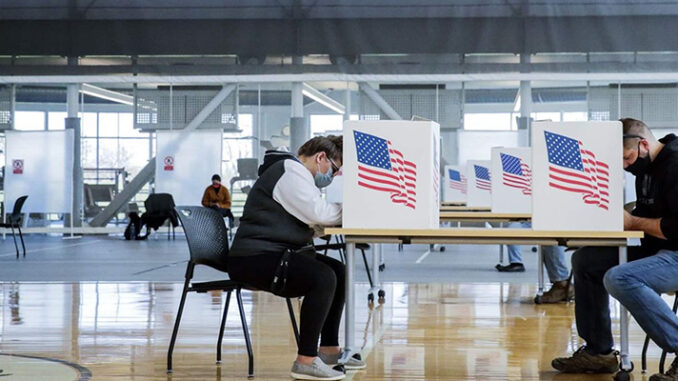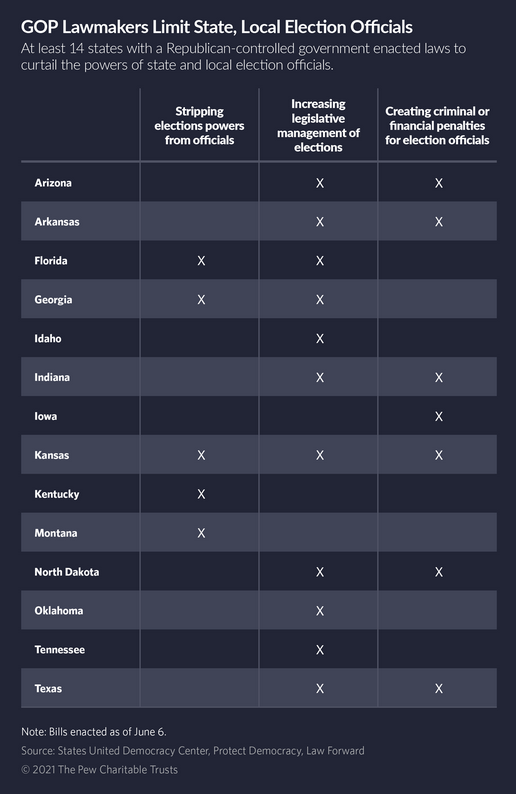
“Some elected officials didn’t like the results, so they’re trying to rewrite the rules, This is a breakdown of what it means to live in the United States. It’s an attack on the democracy. It’s an attack on the idea that Americans get to choose their elected officials.”
by
Republican lawmakers this year passed an unprecedented bevy of bills targeting the authority of state and local election officials, a power grab that might allow partisan legislators to overturn future election results by claiming there was fraud.
GOP legislators in at least 14 states have enacted 23 new laws that empower state officials to take control of county election boards, strip secretaries of state of their executive authority, or make local election officials criminally or financially liable for even technical errors, according to Protect Democracy, a left-leaning Washington, D.C.-based voting rights nonprofit.
Secretaries of state and county election officials around the country, many of them Republican, resisted pressure from former President Donald Trump and his allies to decertify the November 2020 results and reject huge swaths of mail-in ballots to turn the presidential election in his favor. Eight months later, there is growing concern among those officials that these new laws may cut a path for successful efforts in the future.
“Some elected officials didn’t like the results, so they’re trying to rewrite the rules,” said Colorado Secretary of State Jena Griswold, who chairs the Democratic Association of Secretaries of State. “This is a breakdown of what it means to live in the United States. It’s an attack on the democracy. It’s an attack on the idea that Americans get to choose their elected officials.”
Trump, without evidence, continues to falsely assert that widespread fraud cost him reelection. Election security experts and top national security officials have said voter fraud is rare and that the last election was the most secure in U.S. history. Nevertheless, GOP lawmakers say their changes are necessary to protect the integrity of future elections.
“What is to the left suppression, to the right is security,” said Arizona state Rep. John Kavanagh, a Republican. “We think ballots that go to voters who long ago died or moved increases the potential for voter fraud. For every person that votes fraudulently, they’re suppressing the vote of those who vote legally.”

After President Joe Biden won Arizona and Georgia in November, flipping two dependably Republican states, the two states became epicenters in the fight over ballot access and election powers. Republican lawmakers in those and other states, such as Iowa and Texas, have tirelessly sought to limit access to early and mail-in voting and shift election oversight to legislatures.
Arizona Republican legislators inserted a provision into this year’s state budget that stripped Democratic Secretary of State Katie Hobbs of her power to represent the state in election lawsuits.
Until Hobbs’ term ends in 2023, the new law shifts those duties to Republican Attorney General Mark Brnovich. GOP leaders argued Hobbs would not fairly defend the state election laws in court.
“She has a history of not performing her duty to defend state law, but to enter into settlement agreements for laws she didn’t like,” said Kavanagh, who chairs the House Government and Elections Committee. “That’s not her job, so we’re going to put this in the hands of the attorney general.”
Hobbs, however, said this move is a part of a broader, ongoing assault on ballot access that aims to empower the legislature to determine election outcomes.
“This is not about me following the law or not,” Hobbs said. “It’s not just a one-off. Certainly, the attacks we’ve seen on elections on all fronts—on voting rights, on election administration—is all a coordinated attack and this is one aspect of it.”
Democratic state Rep. Athena Salman, the minority whip, said GOP efforts to shift election oversight are a power play by Republicans worried about losing control of state government.
“These policies continue to legitimize through no evidence that our election administrators can’t be trusted,” she said. “It’s incredibly disturbing. It continues to undermine faith in democracy.”
Arizona Senate Republicans have launched a partisan audit of Maricopa County’s results, trying to find evidence of fraud in the hopes of overturning Biden’s win in the state. The audit has drawn widespread ire from election security experts, who say it has compromised the integrity of the Phoenix area’s election equipment.
In Georgia, Republican Gov. Brian Kemp in March signed into law a measure that demotes the secretary of state from the chair of the State Board of Elections and allows the legislature to appoint most members of the board. It also permits the board to suspend election officials.
Using this new law, Republican lawmakers are considering a state takeover of Fulton County elections, threatening local control of the Democratic stronghold in the Atlanta area. After the November presidential election, Republican Secretary of State Brad Raffensperger resisted calls from Trump and other Republicans to decertify Biden’s victory in the Peach State.
New laws nationwide also personally target local election officials, many of whom are still reeling from the challenge of providing safe access to the ballot during the pandemic and contending with a misinformation campaign that sowed doubt in the democratic process.
Joel Miller lives under the fear that making a mistake in his role as the chief election officer for the Cedar Rapids, Iowa, area could cost him up to $10,000.
Republican lawmakers in the Hawkeye State enacted a new measure earlier this year that makes county auditors such as Miller, a Democrat, liable for financial penalties for technical infractions. Those could range from a vote tallying error to proactively sending out absentee ballot applications.
The threat of hefty fines has created hostility between many county officials and the state legislature and secretary of state’s office, he said. Miller sees this as another attack in a nationwide assault on election administration since November.
“It looks very unfair, inappropriate, not based in reality,” he said. “Now, it’s law and we have to deal with it.”
Since Republican Gov. Kim Reynolds signed the Iowa legislation in March, Republican Secretary of State Paul Pate has cited county auditors for more than 10 technical infractions, but none came with a fine. A spokesperson said Pate’s office has provided election officials with resources and information to comply with the measure and has a positive working relationship with a vast majority of the state’s 99 county auditors.
“All Iowans are expected to follow the law, and local election officials are no different,” said Kevin Hall, communications director for the secretary of state’s office, in an email. Republican state Sen. Roby Smith, who chairs the committee that drafted the legislation, declined to comment.
A similar proposal in Texas would make it a felony for county election officials to mail out unsolicited absentee ballot applications. In May, Florida Gov. Ron DeSantis, a Republican, signed into law a measure that would fine county supervisors up to $25,000 for leaving ballot drop boxes unattended.
In Arkansas, Republican lawmakers passed a law that allows the state legislature to investigate county election offices for suspected election fraud. This could lead to the decertification of county election officials, a takeover of county election offices by the State Board of Elections and a fine of up to $1,000 against county officials.
“We’re seeing a trend where highly partisan state legislators are seeking to disrupt the way that elections have been run in this country for decades,” said Jessica Marsden, an attorney for Protect Democracy. “We don’t think you can run a fair election in those circumstances. It’s an incredibly serious threat to our democracy.”
These new measures come as Republican legislators in at least 18 states have enacted 30 new laws that curb early and mail-in voting, add new voter ID requirements and limit the use of ballot drop boxes, according to a July count by the Brennan Center for Justice at New York University School of Law.
“You can’t ignore the context in which these bills are being passed,” said Derek Tisler, a democracy fellow at the Brennan Center. “This is a bad faith pressure campaign. I don’t think anyone disagrees that election officials should follow the law, but these overly punitive laws may chill election officials from performing their jobs.”
Local election officials have been the subject of immense criticism and pressure in recent years, said John Ackerman, Republican clerk for Tazewell County in central Illinois. From the fallout of Russian hacking attempts during the 2016 presidential election to false accusations that the 2020 presidential election was stolen, Ackerman said he must wade through condemnation and misinformation to fulfill his responsibilities.
“It’s disheartening,” he said. “I just have to do my job the best I can and communicate with the public.”
The Brennan Center and the Bipartisan Policy Center, a D.C.-based think tank, last month released a report that found 1 in 3 election officials feel unsafe because of their jobs. The U.S. Department of Justice last month launched a task force centered on threats to election officials.
“Election officials at both the state and local levels are exhausted,” said Tammy Patrick, a senior adviser to the elections program at Democracy Fund, a Washington, D.C.-based foundation that advocates for election officials and democratic reforms. “They’re feeling underappreciated, they’re feeling attacked, they’re feeling under-resourced and it hasn’t stopped since last year.
“Really, at this moment, we should be celebrating local election officials for a job well done in the face of adversity, and instead we’re criminalizing them and placing new restrictions on what they can and cannot do.”
While Travis Weipert, Democratic auditor for Johnson County, Iowa, loves his job, the harassment, legislative threats and broad misinformation have taken a toll. He and his wife have discussed him returning to the private sector, but he wants to stay in his role for now.
“The attacks on us are extremely disappointing,” he said. “I’m totally concerned.”
.
Matt Vasilogambros writes about immigration and voting rights for Stateline. Before joining Pew, he was a writer and editor at The Atlantic, where he covered national politics and demographics. Previously, he was a staff correspondent at National Journal and has written for Outside. In 2017, he completed the 2,650-mile Pacific Crest Trail. He is a graduate of Drake University.
